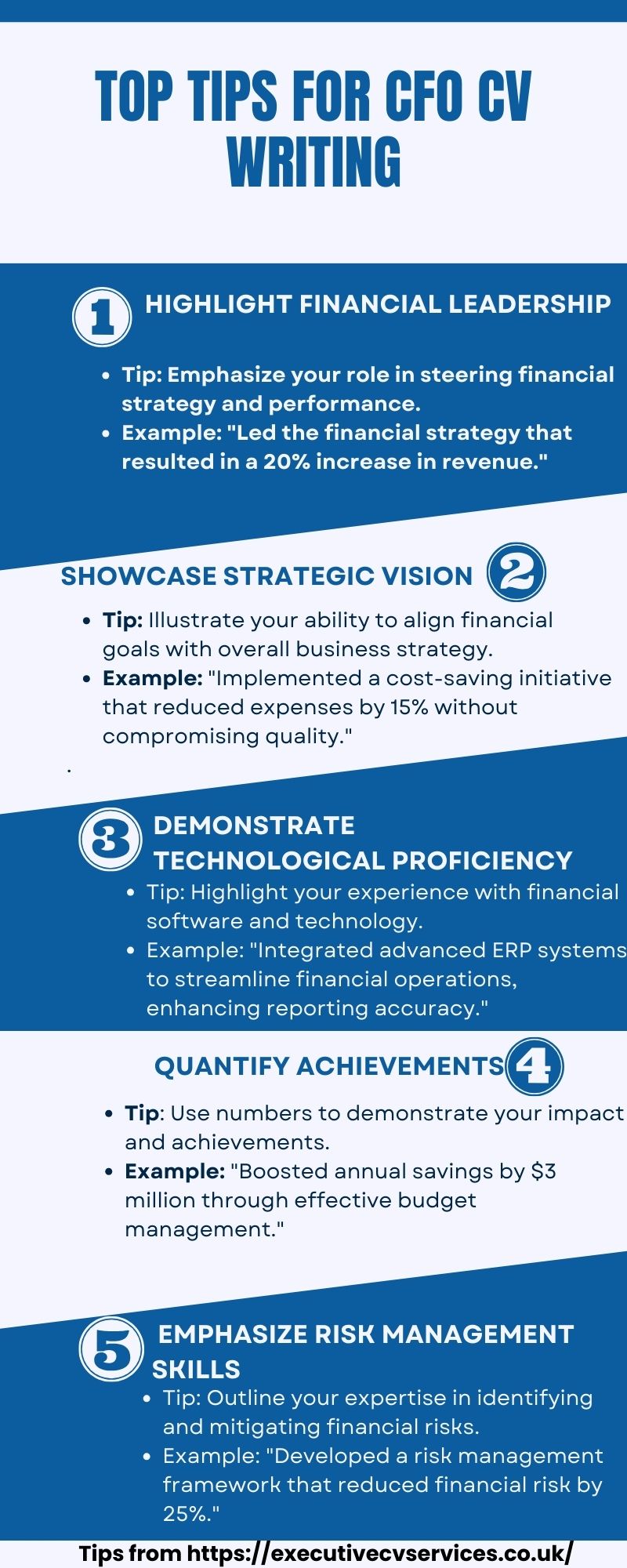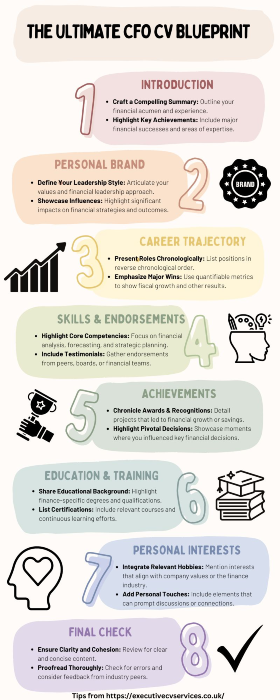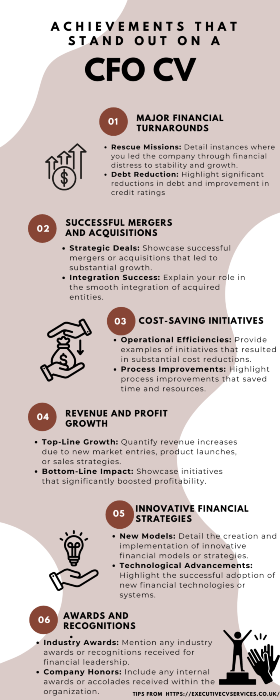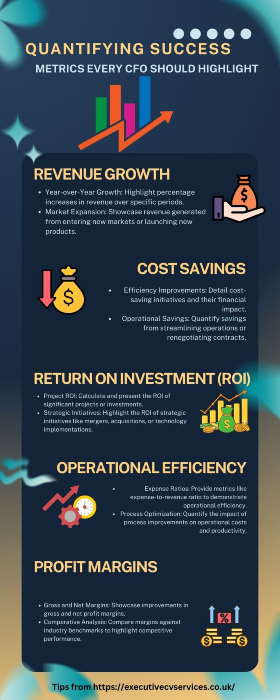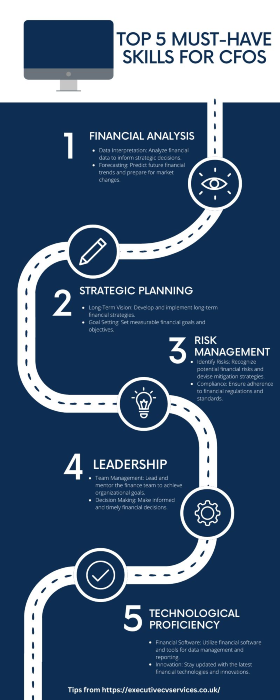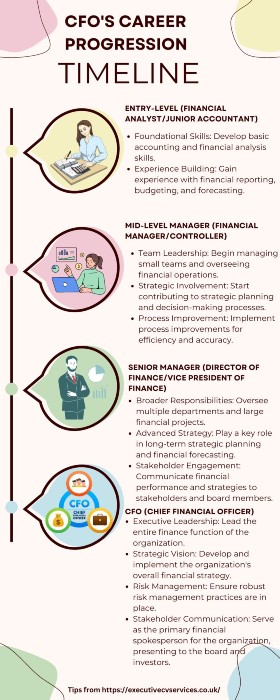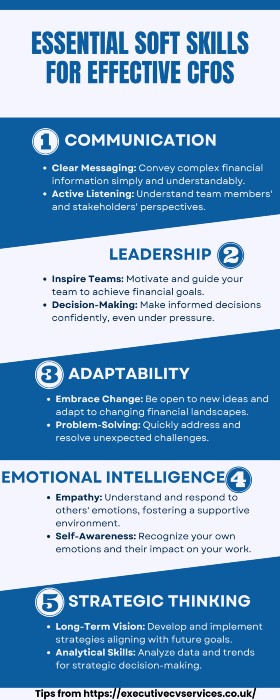Crafting the Perfect CFO CV: Your Guide to Success
1. Introduction: Why a Strong CFO CV Matters
2. Understanding the CFO Role
3. Structuring Your CFO CV
4. Crafting a Compelling Profile Summary
5. Highlighting Key Achievements
6. Showcasing Strategic Leadership
7. The Importance of Financial Acumen
8. Integrating Technology and Digital Transformation Experience
9. Soft Skills that Matter
10. Addressing Career Gaps or Transitions
11. Tailoring Your CV for Different CFO Roles
12. Optimizing Your CV for ATS Systems
13. The Do’s and Don’ts of CFO CV Writing
14. Final Checklist: Is Your CFO CV Ready?
1. Introduction: Why a Strong CFO CV Matters
Tips for Crafting a Powerful CFO CV:
Tip 1: Highlight Leadership and Strategy
A CFO is not just a financial expert but also a strategic leader. Your CV should showcase your ability to drive the financial strategy of the company, manage risks, and lead financial planning.
Tip 2: Tailor Your CV for the Role
Every CFO role is unique, so tailor your CV to reflect the specific requirements of each position. Research the company, its goals, and the industry to align your experience with what they need.
Tip 3: Emphasize Quantifiable Achievements
Recruiters look for measurable results. Include specific numbers such as revenue growth, cost reductions, or successful mergers to demonstrate your impact on past employers.
Tip 4: Make a Strong First Impression
Recruiters typically spend only a few seconds on each CV. Your profile summary and first few bullet points should clearly communicate your most important strengths and accomplishments.
Tip 5: Ensure Clarity and Professionalism
A CFO’s CV should reflect clarity and precision. Use a clean, professional layout with easy-to-read sections, and avoid jargon. An organized CV mirrors the efficiency you’ll bring to the role.
These tips will set the tone for why having a well-structured and powerful CFO CV is crucial to securing top leadership roles.
2. Understanding the CFO Role
Tips for Showcasing Your CFO Expertise:
Tip 1: Emphasize Financial Leadership
CFOs are the financial stewards of their organizations. Highlight your experience in overseeing budgeting, forecasting, and financial reporting, as well as your role in shaping the company’s financial strategy.
Tip 2: Showcase Risk Management Skills
A critical part of the CFO role is managing financial risks. Demonstrate how you’ve successfully mitigated risks, ensured compliance, and safeguarded the company’s financial health in uncertain times.
Tip 3: Demonstrate Strategic Thinking
Beyond numbers, CFOs must drive the overall business strategy. Include examples of how you contributed to long-term planning, mergers and acquisitions, or organizational restructuring to boost company growth.
Tip 4: Highlight Technology and Innovation Experience
Modern CFOs are expected to leverage financial technology. Show how you’ve implemented ERP systems, utilized data analytics, or embraced digital tools to optimize financial operations and decision-making.
Tip 5: Focus on Cross-functional Collaboration
CFOs work closely with other C-suite executives. Highlight your ability to collaborate with other departments, including operations, sales, and HR, to align financial goals with broader business objectives.
These tips help define the multifaceted responsibilities of a CFO and guide how to effectively present your expertise for this critical executive role.
3. Structuring Your CFO CV
Tips for Creating a Well-Organized CFO CV:
Tip 1: Start with a Strong Profile Summary
Begin your CV with a concise, impactful profile summary. Briefly outline your years of experience, key strengths, and what sets you apart as a CFO. Keep it focused and relevant to the role you’re targeting.
Tip 2: Use Clear, Distinct Sections
Organize your CV into clear sections: Profile Summary, Key Skills, Professional Experience, Education, and Certifications. This makes it easy for recruiters to find the information they need quickly.
Tip 3: Focus on Accomplishments, Not Responsibilities
Under each role in your Professional Experience section, highlight your achievements rather than just listing your duties. Use quantifiable metrics to show how you made a difference, such as improving cash flow or reducing costs by a specific percentage.
Tip 4: Prioritize Recent and Relevant Experience
Lead with your most recent and relevant roles. For a CFO, emphasize roles where you’ve had financial leadership and strategic oversight. Limit earlier roles to just essential information, especially if they are not relevant to the CFO position.
Tip 5: Keep the Format Clean and Professional
Ensure your CV has a clean, professional layout. Avoid overly creative designs or fancy fonts. Stick to a format that reflects your professionalism, making your CV easy to read and ATS-friendly.
By structuring your CFO CV with clarity and focus, you’ll present your qualifications in the most effective way to grab the attention of recruiters.
4. Crafting a Compelling Profile Summary
Tips for Writing an Impactful CFO Profile Summary:
Tip 1: Keep It Concise and Focused
Your profile summary should be no longer than 3-4 sentences. Focus on key information like your years of experience, core competencies, and the value you bring as a CFO, avoiding unnecessary detail.
Tip 2: Highlight Key Achievements
Showcase your top achievements in the summary. Include quantifiable accomplishments like “increased revenue by 20%” or “led a successful $50M merger,” giving recruiters an immediate sense of your impact.
Tip 3: Tailor It to the Role
Customize your profile summary for each application. Highlight the skills and experience that align with the specific CFO role you’re applying for, demonstrating how you meet the employer’s needs.
Tip 4: Focus on Leadership and Strategy
Emphasize your leadership qualities and strategic vision. Mention your experience in driving financial strategy, managing large teams, and influencing company-wide decisions to position yourself as a true leader.
Tip 5: Incorporate Industry Expertise
If you have deep experience in a particular industry (e.g., technology, healthcare, manufacturing), mention it in your summary. Industry expertise can make you stand out and show you understand the unique financial challenges of that sector.
A compelling profile summary should give recruiters a snapshot of your expertise and achievements, setting the stage for the rest of your CV.
5. Highlighting Key Achievements
Tips for Showcasing Impactful CFO Achievements:
Tip 1: Quantify Your Achievements
Use concrete numbers to back up your accomplishments. Highlight metrics like “reduced operational costs by 15%,” “improved EBITDA by $10M,” or “led a successful $100M debt restructuring.” Numbers make your impact clear and tangible.
Tip 2: Focus on Strategic Wins
CFOs are responsible for driving strategic initiatives. Highlight achievements where you played a key role in mergers and acquisitions, financial transformations, or long-term growth strategies that impacted the company’s future.
Tip 3: Align Achievements with Business Outcomes
Show how your financial decisions positively affected the company’s bottom line or overall performance. For example, “optimized cash flow management, leading to a 25% increase in liquidity,” links your contribution directly to business success.
Tip 4: Demonstrate Problem-Solving
Include examples of how you solved major financial challenges, such as turning around a struggling department, leading a crisis recovery effort, or introducing innovative financial processes that improved efficiency.
Tip 5: Be Selective and Relevant
Only list achievements that are most relevant to the CFO role you are applying for. Focus on high-impact accomplishments from the last 5-10 years, and avoid cluttering your CV with less important or outdated achievements.
By highlighting key achievements that are quantified and strategically important, you’ll create a compelling case for why you are an outstanding candidate for a CFO role.
6. Showcasing Strategic Leadership
Tips for Demonstrating Strategic Leadership in Your CFO CV:
Tip 1: Highlight Involvement in Business Strategy
CFOs are key contributors to overall business strategy. Showcase examples where you’ve influenced or led company-wide initiatives, such as scaling operations, entering new markets, or driving digital transformation.
Tip 2: Emphasize Leadership During Mergers and Acquisitions
If you’ve led or played a critical role in mergers, acquisitions, or other major financial transactions, highlight these experiences. Mention the size of the deals, your role, and the strategic outcomes, like increased market share or profitability.
Tip 3: Show Your Role in Long-term Financial Planning
Demonstrate your ability to create and implement long-term financial strategies. Highlight your experience in multi-year financial planning, forecasting, and managing large-scale budgets to align financial goals with company objectives.
Tip 4: Include Examples of Crisis Management
Strategic leaders excel in challenging times. If you’ve led your organization through economic downturns, financial crises, or significant industry disruptions, highlight how your strategic decisions helped the company remain stable and thrive.
Tip 5: Showcase Cross-Departmental Leadership
CFOs often work closely with other departments, such as operations, sales, and HR, to align financial goals with broader business objectives. Highlight your role in leading cross-functional teams or initiatives that enhanced overall company performance.
By emphasizing your strategic leadership abilities and your role in shaping the company’s direction, you’ll position yourself as a forward-thinking CFO who can drive business success.
7. The Importance of Financial Acumen
Tips for Demonstrating Strong Financial Acumen in Your CFO CV:
Tip 1: Highlight Expertise in Financial Analysis
Showcase your ability to interpret complex financial data, analyze trends, and provide actionable insights. Mention key financial analysis tools or methodologies you use to guide decision-making and optimize performance.
Tip 2: Emphasize Budgeting and Forecasting Skills
Demonstrate your experience in creating and managing large-scale budgets. Include examples of how your budgeting and forecasting have improved financial outcomes, controlled costs, or enabled strategic growth.
Tip 3: Showcase Experience with Financial Reporting
Financial reporting is a core responsibility for CFOs. Highlight your experience in producing accurate, timely financial reports for stakeholders, including shareholders, boards of directors, and regulatory bodies.
Tip 4: Demonstrate Proficiency in Risk Management
Include examples of how you’ve managed financial risks, ensured compliance with regulations, and safeguarded the company’s financial health. This could include implementing internal controls, monitoring cash flow, or mitigating investment risks.
Tip 5: Show Familiarity with Financial Technology
Highlight your proficiency in using financial software (e.g., ERP systems, financial modeling tools, or business intelligence platforms). Mention how you’ve leveraged technology to improve financial reporting, forecasting, or decision-making processes.
By emphasizing your financial acumen through concrete examples of analysis, forecasting, and risk management, you’ll demonstrate that you possess the technical expertise essential for a successful CFO.
8. Integrating Technology and Digital Transformation Experience
Tips for Showcasing Technology and Digital Transformation in Your CFO CV:
Tip 1: Highlight ERP System Implementation
If you’ve led the implementation or optimization of ERP (Enterprise Resource Planning) systems, mention it. Include details on how these systems improved financial processes, enhanced data accuracy, or increased operational efficiency.
Tip 2: Showcase Data-Driven Decision Making
CFOs increasingly rely on data analytics for financial insights. Highlight your experience in using data-driven tools to make informed decisions, optimize cash flow, or identify growth opportunities. Mention any financial dashboards or KPIs you track.
Tip 3: Emphasize Digital Transformation Leadership
If you’ve led or been part of a digital transformation initiative, emphasize your role. Include details on how you helped modernize financial processes, introduced automation, or led company-wide initiatives to adopt new financial technologies.
Tip 4: Demonstrate Proficiency with Financial Technology
Mention your experience with advanced financial tools like forecasting software, business intelligence platforms, or blockchain for financial management. Demonstrate how these technologies have improved accuracy and decision-making in your organization.
Tip 5: Link Technology to Strategic Goals
Illustrate how your adoption of technology aligns with broader strategic goals, such as improving scalability, reducing costs, or enabling growth. Show that your digital initiatives weren’t just about technology for its own sake, but were part of driving business success.
By highlighting your experience in integrating technology and leading digital transformation, you’ll show recruiters that you are a forward-thinking CFO who can leverage innovation to enhance financial performance.
9. Soft Skills that Matter
Tips for Highlighting Essential CFO Soft Skills:
Tip 1: Emphasize Communication Skills
CFOs need to communicate complex financial information clearly to non-financial stakeholders. Highlight your ability to present data-driven insights in a way that is understandable to executives, boards, and cross-functional teams.
Tip 2: Showcase Leadership and Team Management
Demonstrate your leadership in managing finance teams, fostering collaboration, and mentoring future financial leaders. Include examples of how your leadership has led to improved team performance or more efficient financial operations.
Tip 3: Highlight Negotiation and Influencing Abilities
CFOs frequently negotiate deals, manage vendor contracts, or influence key stakeholders. Showcase your negotiation skills with examples, such as securing favorable financing terms, or influencing strategic decisions that positively impacted the business.
Tip 4: Demonstrate Problem-Solving and Decision-Making Skills
CFOs must make quick, effective decisions in high-pressure situations. Highlight examples where you’ve resolved financial challenges or made key decisions that helped the company navigate through crises or capitalize on opportunities.
Tip 5: Showcase Adaptability and Emotional Intelligence
The ability to adapt in dynamic business environments is crucial for a CFO. Include examples of how you’ve adjusted to changing market conditions, managed through organizational change, or demonstrated empathy and understanding in leadership roles.
By highlighting these critical soft skills, you’ll show recruiters that you not only possess technical expertise but also the interpersonal and leadership qualities essential for a successful CFO.
10. Addressing Career Gaps or Transitions
Tips for Handling Career Gaps or Transitions in Your CFO CV:
Tip 1: Be Transparent About Career Gaps
Address any gaps in your employment directly. Provide a brief explanation, such as taking time for personal development, family care, or other valid reasons, and focus on how you stayed engaged with industry trends or upskilled during that time.
Tip 2: Highlight Transferable Skills in Career Transitions
If transitioning to a CFO role from a different function or industry, emphasize transferable skills. Highlight leadership, financial management, or strategic planning skills that apply to the CFO position, even if they were gained in a different context.
Tip 3: Emphasize Any Professional Development During Gaps
Showcase any certifications, courses, or professional activities you pursued during a career gap. Demonstrating that you used the time to improve your skills—such as taking a finance course or earning a leadership certification—helps close the gap effectively.
Tip 4: Reframe Non-Traditional Experience Positively
If your career path includes roles outside of finance, reframe this experience to show how it adds value. For example, experience in operations or marketing can demonstrate your broad understanding of business strategy and cross-functional leadership.
Tip 5: Focus on Recent and Relevant Experience
In cases of career transitions, prioritize your most recent and relevant roles. Highlight the responsibilities and achievements that align most closely with the CFO role, even if some experience comes from outside the finance function.
By addressing career gaps or transitions confidently and framing your past experience as relevant to the CFO role, you’ll show resilience and a well-rounded professional profile.
11. Tailoring Your CV for Different CFO Roles
Tips for Customizing Your CFO CV for Specific Positions:
Tip 1: Research the Company and Industry
Before tailoring your CV, research the company and its industry to understand their specific needs. Highlight relevant experience, such as industry-specific knowledge or previous roles in sectors similar to the one you’re applying for.
Tip 2: Align Your Profile Summary with the Job Description
Customize your profile summary to reflect the key responsibilities and skills mentioned in the job description. Use keywords and phrases that match the company’s expectations to show you are a perfect fit for the role.
Tip 3: Highlight Role-Specific Achievements
If the role emphasizes certain aspects of the CFO position—like cost-cutting, fundraising, or digital transformation—focus on relevant achievements from your past experience. Tailor examples that demonstrate you’ve excelled in the specific areas the company prioritizes.
Tip 4: Adjust Key Skills Based on the Job Requirements
Each CFO role may prioritize different skill sets, such as mergers and acquisitions, compliance, or international finance. Make sure your skills section reflects the abilities most relevant to the role, without omitting your core competencies.
Tip 5: Showcase Adaptability for Different Company Sizes
Tailor your CV based on whether the role is with a large corporation, a mid-sized business, or a startup. Emphasize relevant experience, like scaling finance teams or managing large budgets for bigger firms, or show agility and hands-on involvement for smaller, growing businesses.
By tailoring your CV for different CFO roles, you’ll demonstrate that you’re not just a capable CFO but the right CFO for that specific company and position.
12. Optimizing Your CV for ATS Systems
Tips for Ensuring Your CFO CV Passes ATS Screening:
Tip 1: Use Relevant Keywords from the Job Description
Analyze the job description for key terms related to skills, qualifications, and responsibilities. Incorporate these keywords naturally throughout your CV, especially in your profile summary and experience sections, to enhance ATS compatibility.
Tip 2: Choose a Simple, ATS-Friendly Format
Use a clean, straightforward layout without complex designs, graphics, or unusual fonts. Stick to standard headings like “Professional Experience,” “Education,” and “Skills” to ensure the ATS can easily parse your CV.
Tip 3: Avoid Using Headers and Footers
Some ATS may struggle to read information placed in headers or footers. Keep all important information within the main body of the document to ensure that nothing is missed.
Tip 4: Use Standard Job Titles and Terminology
Use conventional job titles and industry-standard terminology instead of creative variations. For example, use “Chief Financial Officer” rather than “Finance Guru” to ensure that the ATS recognizes your role correctly.
Tip 5: Save Your CV in the Right Format
Save your CV in a compatible format, typically as a .docx or PDF, as specified by the employer. Some ATS prefer Word documents, while others may accept PDFs; check the job application instructions carefully.
By optimizing your CV for ATS systems, you’ll improve your chances of passing the initial screening process and getting your application in front of hiring managers.
13. The Do’s and Don’ts of CFO CV Writing
Tips for Crafting an Effective CFO CV:
Do’s:
Tip 1: Do Tailor Your CV for Each Application
Customize your CV for each CFO position you apply for. Highlight relevant experience, achievements, and skills that align with the specific requirements of the job description.
Tip 2: Do Use Clear and Concise Language
Write in a clear, concise manner, using bullet points to break down complex information. This makes it easier for recruiters to quickly grasp your qualifications and achievements.
Tip 3: Do Include Specific, Quantifiable Achievements
Use metrics to showcase your accomplishments. For example, “Increased revenue by 30% within two years” or “Reduced operational costs by $2M” effectively highlights your impact in previous roles.
Tip 4: Do Keep Your CV Updated
Regularly update your CV to reflect new experiences, skills, and accomplishments. This ensures that you are always prepared to apply for new opportunities without scrambling to remember important details.
Tip 5: Do Highlight Soft Skills
Include soft skills that are crucial for a CFO, such as leadership, communication, and problem-solving abilities. These skills are often just as important as technical financial expertise.
Don’ts:
Tip 6: Don’t Include Irrelevant Experience
Avoid listing jobs or experiences that do not relate to the CFO role. Focus on positions and accomplishments that showcase your financial leadership and strategic impact.
Tip 7: Don’t Use Jargon or Technical Language
While it’s important to demonstrate your financial expertise, avoid using overly complex jargon or technical terms that may not be understood by all readers. Keep your language accessible and professional.
Tip 8: Don’t Make Your CV Too Long
Aim to keep your CV to two pages or less. Be concise and selective with the information you include to maintain the recruiter’s interest and ensure your key qualifications stand out.
Tip 9: Don’t Use an Unprofessional Email Address
Use a professional email address that includes your name. Avoid casual or quirky email addresses that could undermine your professional image.
Tip 10: Don’t Forget to Proofread
Always proofread your CV for spelling, grammar, and formatting errors. A polished CV reflects attention to detail, which is critical for a CFO role.
By following these do’s and don’ts, you’ll create a compelling CFO CV that effectively showcases your qualifications and positions you as a strong candidate for leadership roles.
14. Final Checklist: Is Your CFO CV Ready?
Tips for Ensuring Your CFO CV is Polished and Ready for Submission:
Tip 1: Review for Tailoring Consistency
Double-check that your CV is tailored to the specific CFO role you’re applying for. Ensure that relevant experience, skills, and achievements align with the job description and demonstrate your fit for the position.
Tip 2: Confirm Accurate Contact Information
Verify that your contact information is correct and up-to-date. Include your name, phone number, email address, and LinkedIn profile if applicable, making it easy for recruiters to reach you.
Tip 3: Ensure Clarity and Readability
Review your CV for clarity and readability. Use consistent formatting, clear headings, and bullet points to make information easy to scan. Avoid dense paragraphs that can overwhelm the reader.
Tip 4: Check for Quantifiable Achievements
Ensure that you have included specific, quantifiable achievements that highlight your impact in previous roles. Review your metrics to confirm they are accurate and compelling.
Tip 5: Proofread for Errors
Thoroughly proofread your CV for any spelling, grammar, or punctuation errors. Consider asking a trusted colleague or friend to review it as well, as a fresh set of eyes can catch mistakes you might overlook.
Tip 6: Evaluate Length and Relevance
Ensure that your CV is concise and relevant, ideally no longer than two pages. Remove any outdated or irrelevant information that does not contribute to your candidacy for the CFO role.
Tip 7: Verify ATS Compatibility
Check that your CV is formatted for ATS compatibility by using standard headings, avoiding graphics, and saving it in the preferred format (usually .docx or PDF) as specified by the job listing.
Tip 8: Prepare a Cover Letter
If applicable, prepare a tailored cover letter to accompany your CV. Use this opportunity to expand on your qualifications and express your enthusiasm for the specific CFO role.
By following this final checklist, you’ll ensure that your CFO CV is polished, tailored, and ready to make a strong impression on potential employers
